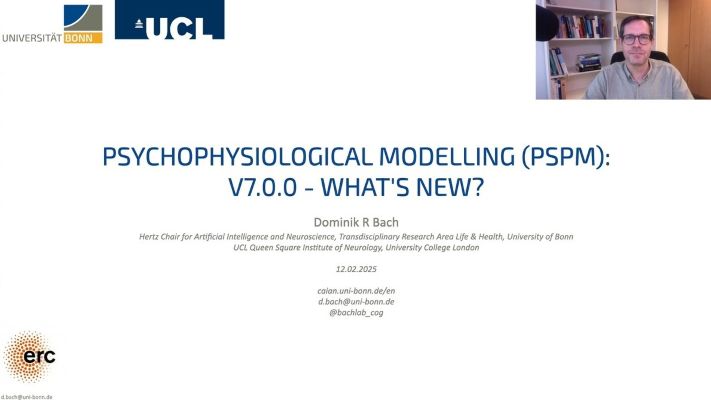News
12.02.2025
PsPM 7.0.0 released, a complete revamp of the GUI and function logic with a focus on user experience, robustness and maintainability. Backwards compatibility is partial: PsPM data files from previous versions can be read, PsPM first-level model files are can be processed with the exception of extracting segments, Matlabbatch and function calls created with previous PsPM versions require adaptation.
29.02.2024
Fear conditioning can be index by various psychophysiological data types, but how these indices relate to each other? In this new paper, Mancinelli, Sporrer, et al. find in N = 256 persons that fear conditioning strength estimated from SCR, heart period, respiration, and pupil size, covaries on only one dimension, suggesting that these indices are measuring the same latent variable. Combining two or more of these indices improves retrodictive validity in out-of-sample generalisation tests and can thus help reducing sample size at the same statistical power.
09.02.2024
A new pre-clinical paper published that uses PsPM: Wehrli, Xia et al. report the (lack of an) effect of the matrix metalloproteinase inhibitor doxycycline on configural fear memory consolidation.
25.01.2024
PsPM 6.1.2 released – including bug fixes for the GUI, DCM, and GLM.
18.-19.01.2024
Livestreamed PsPM course (2 half-days).
17.01.2024
PsPM 6.1.1 released – including new functions check model, combine markchannels, a trial-average first-level model, bug fixes and various improvements.
A new pre-clinical paper published that uses PsPM: Xia, Wehrli et al. establish on the effect of the matrix metalloproteinase inhibitor minocycline on configural fear memory consolidation.
24.08.2023
PsPM 6.1.0 released – including pspm options for parameter controlling, AppDesigner for the launchpad, various UI improvements, bug fixes and adjustments for functions like dcm, glm and sf, and more.
16.07.2022
PsPM 6.0.0 released – including developer mode, gaze signal post processing, improvements to pupil data preprocessing, improved file overwriting behaviour, support for pulse oxymetry data, various bug fixes and improvements for functions, and more.
